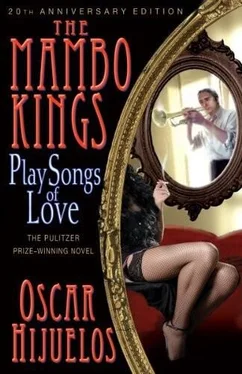In her own way, Delores became something of a stoic. Life would have its limited pleasures. There was sunlight, there were boys and men to give her the up-and-down on the street; there were funny letters from her older sister, Ana María, in Cuba; there were the Hollywood films at the big movie house on Fordham Road; there were romantic novels; there were little boxes of bonbons; there were diaper-dragging two-year-olds toddling on the sidewalk outside her building; there were flowers in the park and pretty dresses in store windows. But there was nothing to overcome her feeling that the world was veiled by a melancholia which emanated from her poor father’s sadness. She was stoic enough that few things bothered her, and although she was at an age when young girls fall in love, she never dreamed about it, until one night, when she decided to follow her father to a dance hall.
That night, while her father was out, Delores went searching the apartment for some paper and found a flier for the Dumont Ballroom on East Kingsbridge Road. She felt an overwhelming desire to see him. Dressed up, she walked down that steep hill, caught a Jerome Avenue subway north, and arrived at the ballroom. There she found herself in a zoot-suit haven of slick young men. Many of them were tough, lean veterans of the war who whistled at her and called out to her. Lines like “Enchantment, where are you going?”
“Enchantment” found her father at the bar drinking, his shirt covered in sweat. He was talking to a woman who looked just the way Delores had imagined her. She was in her late thirties, quite plump, a little overripe in a cheap dress. She has the face of a whore, Delores had first thought, but when her father, acting as if nothing was out of the ordinary, introduced Delores to this woman, the woman’s face brightened with friendliness.
“My, but you’re pretty,” the woman said to Delores.
Delores blushed at the compliment. What could she be angry about? Her father had his arm wrapped around the woman’s fleshy hips. He was smiling in a way that she hadn’t often seen before, happily. And exhaustion had left his expression. What could she be angry about, at these two lonely people trying to comfort one another at a bar in a dance hall? Onstage, the orchestra was playing “Frenesí .” Her father leaned close to Delores and asked, “Delorita, what is it that you want?”
“Papi, I want you to come home.”
He didn’t even answer that, just made a looping motion with his cigarette and said to the woman, “Now, can you see that? My own daughter’s giving me orders. Me, the man.”
Then he smiled.
“Come on, don’t be like your mother.”
Then the orchestra started to play a tango and the three of them stepped out into the crowd of shadows. Right then and there she saw that her father was a fabulous and graceful dancer, and that this dancing seemed to offer him release from his pain. He took hold of her by the hand and began showing her the three-strided slides of the tango. With her cheek pressed against his warm face, with the lights swirling about, and the perfume-scented shadows swarming around them, she had a daydream about dancing with him in that same way forever… Then the song ended and the woman came out to join them. Delores moved off to the side and watched as her father went back out onto the dance floor. Delores watched them spinning in circles. He was a good dancer. He did the lindy hop and the rumba and he jitterbugged with the best of them. Up on the bandstand, an outfit called the Art Shanky Orchestra, a troupe of pinstripe-suited musicians, were playing their hearts out. Their golden trumpets seemed magical because of the way they rejuvenated her father. He danced right into a spotlight and threw a silhouette that crept up the curtained walls of the dance hall a hundred feet high. A crooner got up and started to sing “Moonlight Becomes You.” That’s when her father and this woman went back to the bar. Exhausted by the fast dances, her father then said to his daughter, “This place isn’t so bad, now, is it?”
He leaned with his back against the bar, and as the woman wiped off his forehead with a handkerchief and dabbed sweat from his lips, it seemed as if she was wiping years of strain and unhappiness off his face. For one moment, a moment when he seemed spellbound by the spotlight and the music, he lifted out of himself, floating upwards to a place of eternal relief and comfort. He lit a cigarette and said, “Delorita, over there, that American fellow’s looking at you.”
At the end of the bar was a tall man, looked Irish or German, with a head of wavy blond hair. He was dressed in a sports jacket and bow tie and seemed quite clean. He was in his mid-twenties. Delores was now seventeen.
The man smiled. A little later, he came over and respectfully asked Delores to dance. She’d already turned down a number of other requests, and she turned him down, too.
“I just wanted to talk to you anyway. My name’s — And I know this seems a little unlikely, but you have to believe me… See, I work for the Pepsodent toothpaste company and we’re holding a beauty contest down in Coney Island in a couple of weeks, and so, I just thought that you might like to enter. I mean, if you give me your name and all that, I can take care of everything… There’s a first prize of one hundred dollars.” Then, looking away, he added, “And you’re certainly pretty enough to win…”
“What do I have to do?”
“You just put on a bathing suit — do you have a bathing suit? — and you get up in front of the people. It’s on a Saturday morning… Why don’t you give me ya address, huh? It would be a nice thing for you.”
He put up his hands as if to say, “I’m not armed…”
She blushed, looking away. “You can find me at the Woolworth’s on Fordham Road. I work there part-time.” And she wrote down her name, Delores Fuentes.
He looked over the piece of paper and said: “You have really beautiful handwriting.”
“I can write down poems for you. I write my own, and I learn poems in English.”
“Yeah?”
“You want me to write one down?”
“Sure.”
She turned to the bar and meticulously wrote out the poem “Annabel Lee,” by Edgar Allan Poe.
“You’re kidding me?” And he scratched his head, put the poem in his pocket, and said, “You’re really classy, you know that?”
Later, around three o’clock, when the dance was winding down, Delores no longer felt angry or anxious about her father. As a matter of fact, she now seemed happy about the dance hall. And her father didn’t even seem drunk. As they left the dance hall together, he walked with his back straight and his head held high. It made her happy to think about coming back here. People paid you compliments, and said you were pretty enough to enter a beauty contest! She and her father were heading to the bus stop, and as they crossed the street to catch a downtown bus, the American fellow dazzled Delores, pulling up alongside them in a 1946 Oldsmobile. It was a convertible and the canvas-top roof had been pulled down.
“Let me drive you folks home.”
And so they climbed into his car, feeling like wealthy people. Her father plopped down into the plump leather upholstery of the back seat. He put his arm around Delores, eventually falling asleep and snoring, as the car drove away.
The fellow she’d met in the dance hall was a nice man. He would show up at the Woolworth’s to make sure that she’d enter the contest, brought her a box of chocolates, a bouquet of flowers, a little cuddly teddy bear. On the day of the contest he drove over to the Bronx from his apartment on Dyckman Street and then took her down to the boardwalk of Coney Island in his open convertible. He was a sporty-looking fellow. That day he wore a light blue summer suit, with a light pink shirt and a red bandana around his neck. As they drove along, his golden hair whipped like a sea flag in the wind. He was muy guapo —handsome — and seemed prosperous. That day the beach’s sand warmed the bottoms of more than a million people, and while looking at them from the stage, she experienced vertigo. Being seen by so many people in that endless crowd was like flying through the air, especially when she stepped out of her robe and marched her winsome body out to where the people could see her. Greeted with a deafening volley of whistles and hoots, she took third place in the beauty contest and won twenty-five dollars. Then the nice man took her to the amusement park, paid for all the rides and treats she wanted. Then it was getting late and he said, “Now for the surprise.” And they drove beyond Coney Island and off to an Italian seafood restaurant by Avenue X.
Читать дальше












